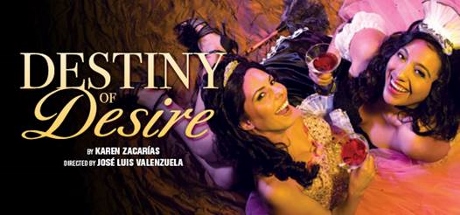A SEASON OF SOAPS IN ONE SHOW
An exhilarating, over-the-top, floridly artificial romp, Destiny of Desire is as wonderfully hokey as its title. A Chicago premiere, Goodman Theatre’s co-production with South Coast Repertory is Karen ZacarÃas’ affectionate salute to the romance of the telenovela. Her stylized showcase is a giddy treat that quietly carries an exuberantly pro-feminist message, charmingly camouflaged in a feast of hysterical histrionics and enthralling excess.
It’s also a 150-minute crash course in a genre unfamiliar to non-viewers of Telemundo or Univision. Prime-time fodder for millions of Spanish-speaking viewers, the telenovela soap opera spins a serialized TV story that lasts an entire season. Stretching into 200 episodes seen six times a week, telenovelas are ripe with bodice-ripping sexual entanglements, shameless emoting to and beyond the cameras, Bollywood-style production numbers, and escapist decor. (The first big telenovela carried the sidesplitting title “The Rich Also Cry.”)
But there’s content as much as style in their roller coaster storylines crammed with lies and secrets, melodramatic overkill, musical interludes, and personal odysseys that react to or inspire cultural change. They often include editorializing PSAs concerning abortion, class divisions, homosexuality, political corruption, divorce and family planning. Governments, aware of how much they influence voters, are always seeking to manipulate them into partisan propaganda.
With its stilted exposition, bravura theatrics, flouncing set changes, florid dialogue, and elaborately convoluted plot twists and sudden surprises, Destiny of Desire represents this entertainment very well. Sung in Spanish and English, the songs by Rosino Serrano are delightful distractions. To watch this pell-mell, peddle-to-the-metal, utterly unsubtle staging by José Luis Valenzuela is like seeing an entire serial year fast-forwarded into two acts’”a perfect parody as well as a sweet salute.
Supposedly performed in an abandoned Chicago theater, eleven actors run many gamuts (including who chews the most scenery, who wears the most costumes, and who plays best to the balcony). The locale for all this contrived fun is “the fictitious Bellarica, Mexico’”a prosperous desert town with casinos, hotels, parks, restaurants and a great disparity of wealth. The rich live near the Zócalo (center of town); the poor live far on the outskirts.”
And that just about tells you what to expect in a twisted tale of undeserved privilege rightly punished, poverty nobly rewarded, and mistaken identities and strategic switches at birth that borrow shamelessly from Mark Twain’s The Prince and the Pauper, Shakespeare’s Comedy of Errors, and the ever-accommodating Cinderella fairy tale. (There’s even a glass slipper left behind at the ball.) The destinies pursued by desire require, it seems, plenty of hilarious homage and artful imitation.
It’s a dark and stormy night in a makeshift hospital when two female babies are intentionally mixed up. Rich child Victoria Maria (Ella Saldana North), who has a heart condition, gets palmed off by her wicked, selfish mother Fabiola Castillo (Ruth Livier) on poor parents Hortencia (Elisa Bocanegra) and Ernesto del Rio (Mauricio Mendoza). Fabiola and her scandal-courting husband Armando (Castulo Guerra), proprietor of the wealthiest casino in town, unofficially “adopt” the del Rios’ healthier infant and, to get her out of the way, falsely accuse sweet-tempered Hortencia of attempted homicide.
18 years later, the girls’ destinies have taken very different paths: The always-ailing but gambling-crazy Victoria predictably serves as maid to the poetry-writing Pilar Esperanza Castillo (the wonderfully named Esperanza America). Steeped in surrogate sisterly solidarity, they experiment with some lesbian dalliances. The heavy petting and smooching of course triggers the usual parental overreactions. When the senoritas attend a fateful charity ball not unlike Cinderella’s big night out, the nearly identical ladies fall for Pilar’s hunky supposed half-brother, the cyber-savvy Sebastian Jose Castillo (Eduardo Enrikez), and the idealistic Dr. Diego Mendoza (Fidel Gomez), son of unscrupulous Dr. Jorge Ramiro Mendoza (Ricardo Gutierrez). That, of course, is when, on another dark and stormy night, vicious villainess Fabiola hurls virtuous Victoria out into the desert to die. Throw in some threats of incest to rival the temptations of homosexuality and you’ve got some truly tabloid theater!
Denoted by Brechtian placards proclaiming their edifying contents, the silly to sturdy scenes twist and turn like the lower Mississippi. By show’s end they deliver more ridiculous reversal and recognition scenes than Shakespeare’s late romances combined. And, like the Bard, Destiny ends with a deliciously elegant double marriage.
With never a dull moment, the Goodman stage is chockablock with side-splitting sight gags, cinemascopic double takes, purity-ball pageantry, old-fashioned Foley sound effects, fantastic rolling scenery (by François-Pierre Couture), and flamboyant finery (from Julie Weiss). Valenzuela’s intentionally overachieving cast (which also includes composer Serrano on piano and Evelina Fernández as a surprisingly noble nun) deliver a rogues gallery of marvelously overwrought performances. It’s more ham than Armour ever sliced.
Alas, as if fearing she’s not serious enough, ZacarÃas does manage to become a party pooper for her own play. Repeatedly she stops the follies so the characters can deliver facts about American life, usually involving the oppression of women and the growth of Hispanic audiences. The statistics, though good to know and never irrelevant, seem to punish an audience for daring to have a good time in a wicked world. That’s not nice. But everything else on the Albert stage is muy, muy bueno.
photos by Liz Lauren
Destiny of Desire
Goodman Theatre
Albert Theatre, 170 North Dearborn
ends on April 16, 2017
for tickets, call 312.443.3800 or visit Goodman Theatre
for more shows, visit Theatre in Chicago








